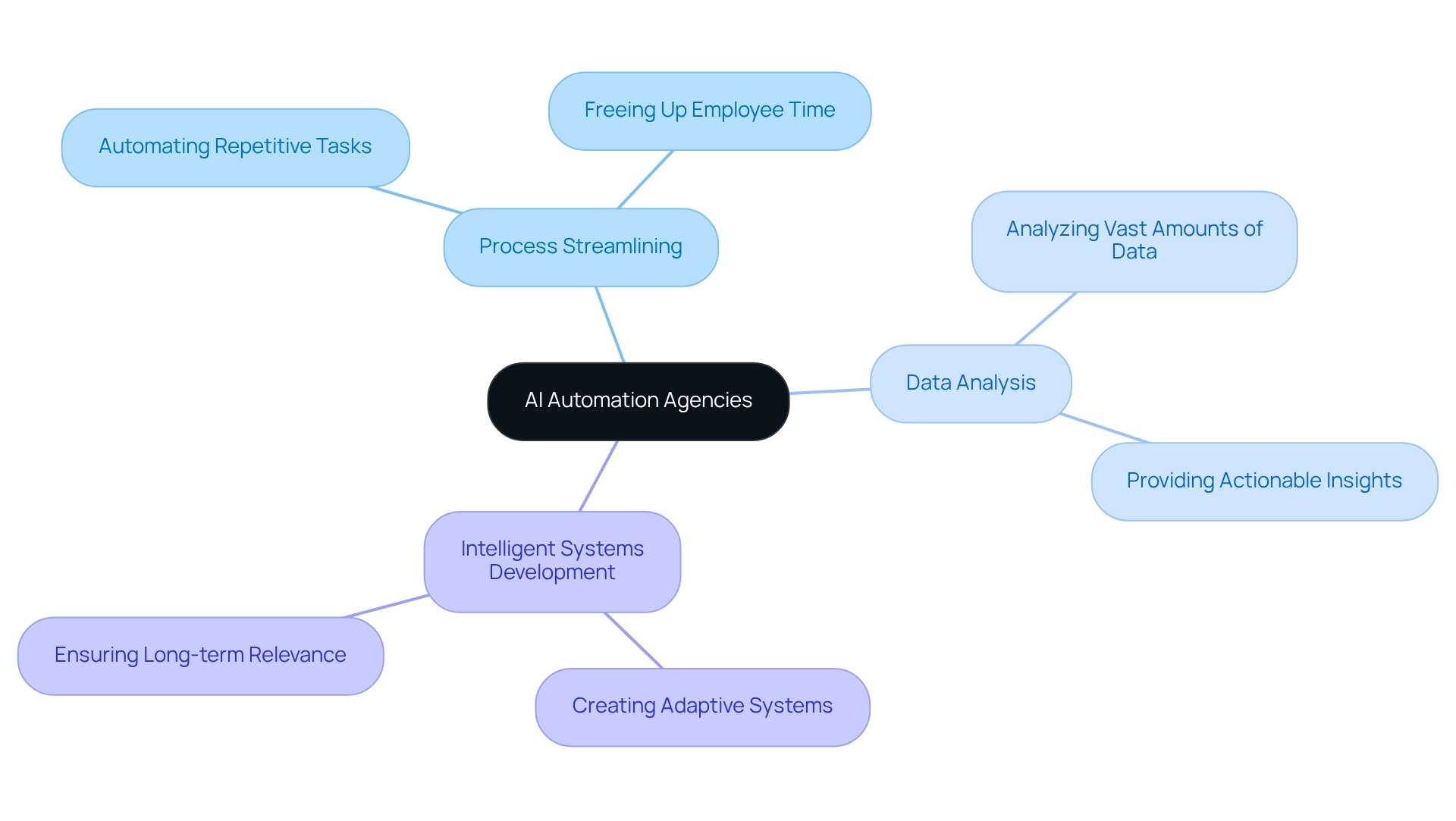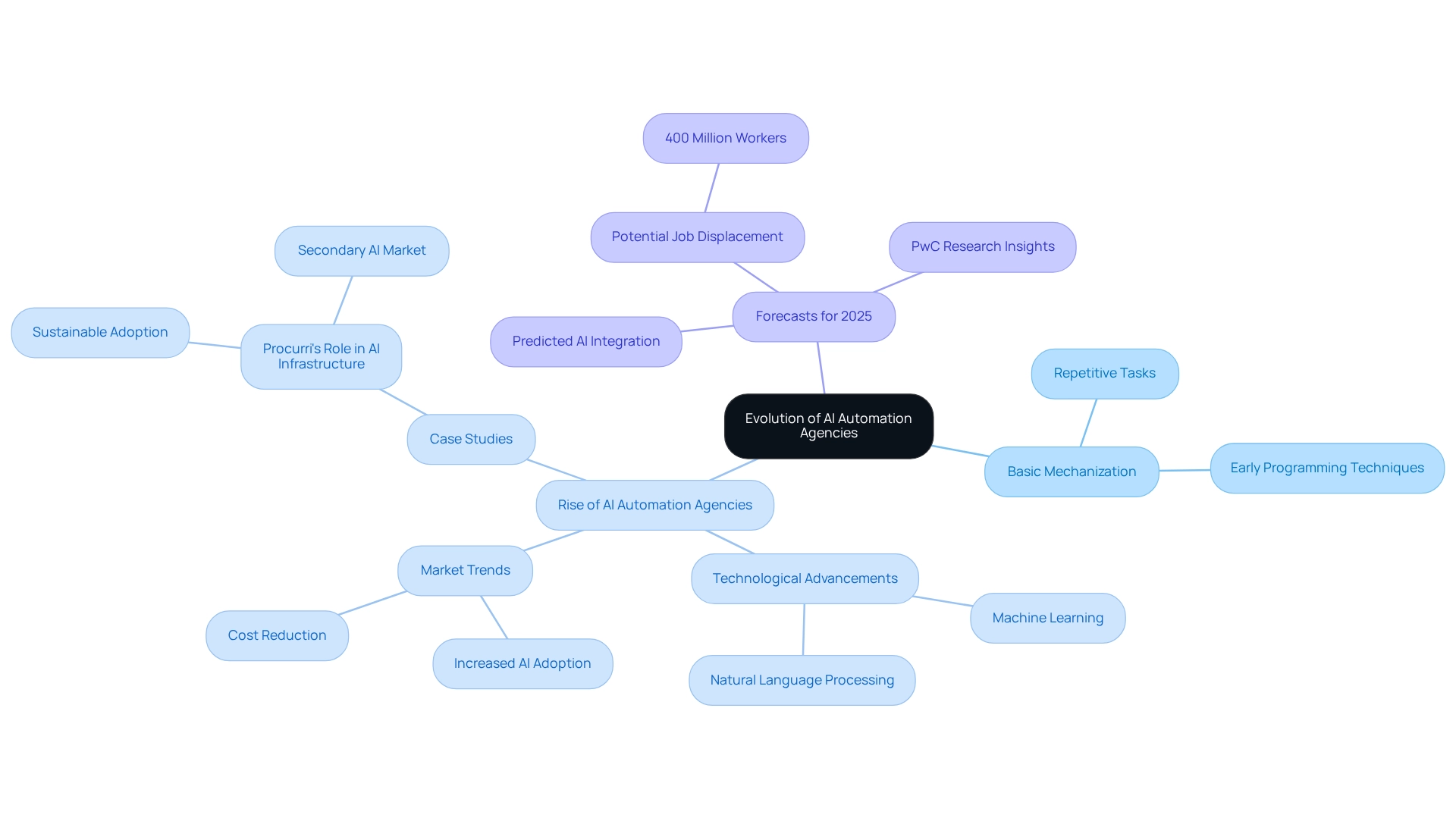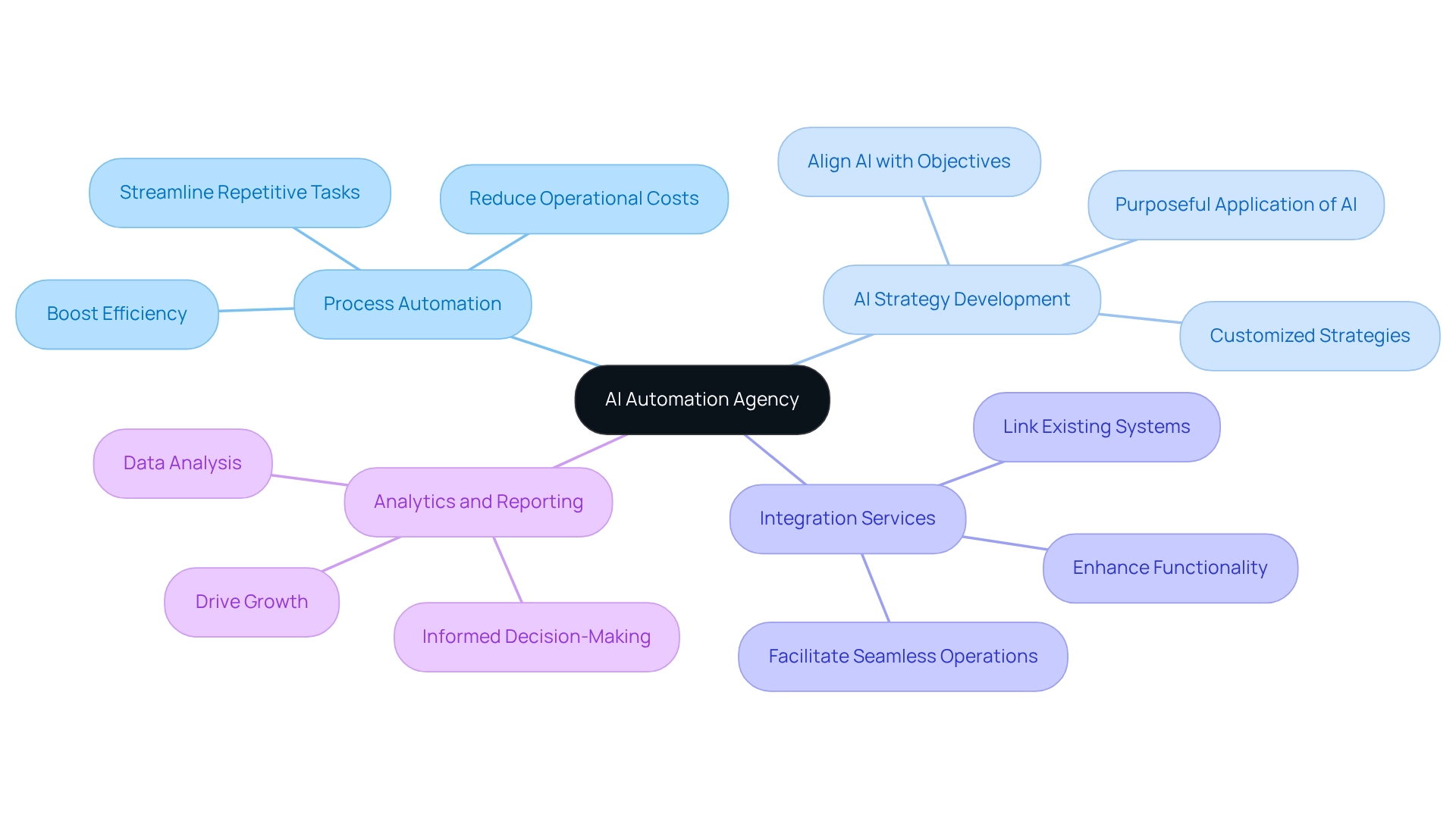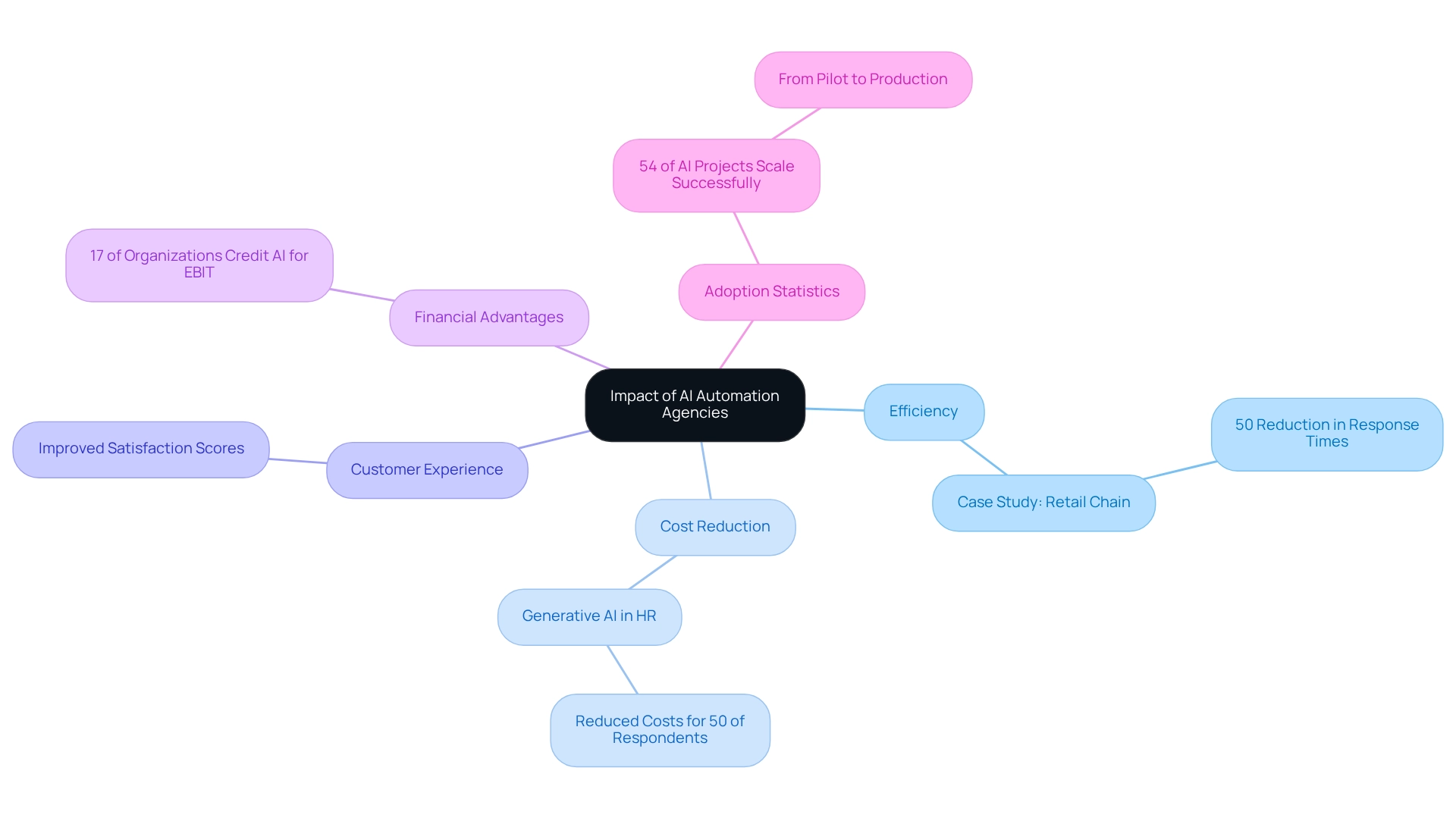
Understanding the AI Automation Agency: Key Functions and Impact

Overview
The article examines the pivotal functions and influence of AI automation agencies—specialised firms that harness artificial intelligence to optimise business processes and elevate operational efficiency. These agencies are adept at:
- Streamlining workflows
- Offering data-driven insights
- Developing intelligent systems
This ultimately drives growth and innovation across diverse sectors. Significant improvements in task efficiency and cost reduction have been reported by organisations that employ AI solutions, underscoring the transformative potential of these technologies. Small business owners must recognise the value these agencies bring to their operations.
Introduction
In the rapidly evolving landscape of business technology, AI automation agencies have emerged as crucial players, redefining how organisations operate and engage with their customers. These specialised firms leverage artificial intelligence to streamline processes, enhance operational efficiency, and foster innovation, allowing businesses to focus on higher-value activities. With a growing emphasis on data-driven decision-making and tailored solutions, AI automation agencies are not just optimising workflows; they are reshaping the future of work itself.
As industries increasingly adopt AI technologies, understanding the core functions and transformative potential of these agencies becomes essential for any organisation looking to thrive in an AI-driven era. Research shows that organisations utilising AI automation see substantial improvements in productivity and customer engagement. Experts agree that embracing these technologies is no longer optional—it is a strategic imperative.
Are you ready to explore how AI can revolutionise your business operations?
Defining AI Automation Agencies: Core Concepts and Functions
AI technology firms are specialised organisations that harness the power of artificial intelligence to optimise workflows, enhance efficiency, and elevate customer interactions. Acting as strategic collaborators, these firms, as an AI automation agency, assist enterprises in adopting AI-driven solutions that automate routine tasks and improve workflows, ultimately driving growth. By integrating AI across various operational facets, these organisations enable companies to focus on higher-value activities, significantly diminishing manual workloads.
Key functions of AI streamlining organisations include:
- Process Streamlining: Automating repetitive tasks to free up valuable time for employees.
- Data Analysis: Utilising AI to analyse vast amounts of data, providing actionable insights that inform decision-making.
- Intelligent Systems Development: Creating adaptive systems that evolve with changing corporate needs, ensuring long-term relevance and efficiency.
Research shows that 21% of organisations employing generative AI have fundamentally redesigned some workflows, underscoring the transformative impact of AI on operational processes. Furthermore, a recent survey indicates a significant rise in AI utilisation across various organisational functions, particularly in IT, marketing, and sales, reflecting a broader incorporation of AI technologies into essential operations, which highlights the role of an AI automation agency. As we navigate this AI-driven era, industry leaders emphasise the importance of collaboration among enterprises, consumers, and policymakers to ensure that the advancement of AI is guided by principles of equity, transparency, and human-centred values. This cooperative approach is vital for maximising the benefits of AI technology while addressing potential challenges.
Looking ahead to 2025, the landscape of AI service providers continues to evolve, with tangible examples demonstrating their effectiveness in optimising business operations. These organisations not only enhance operational efficiency but also play a crucial role in fostering innovation and competitiveness in the marketplace.

The Evolution of AI Automation Agencies: Historical Context and Market Trends
The concept of mechanisation has evolved significantly over the decades, transitioning from basic programming centred on repetitive tasks to the sophisticated AI technologies we witness today. The late 2010s heralded the rise of the AI automation agency, which leveraged advancements in machine learning and natural language processing to provide more intricate solutions. This transformation has been driven by a growing recognition among companies of the AI automation agency's potential to enhance operational efficiency and reduce costs. Market trends reveal a rapid increase in AI adoption, with forecasts suggesting that by 2025, a substantial number of organisations will have integrated AI-driven processes into their operations. Research from PwC underscores the potential benefits of widespread AI implementation, predicting transformative effects across various sectors in the coming decade. Furthermore, historical case studies, such as Procurri's role in facilitating sustainable AI infrastructure, illustrate how businesses are adapting to effectively harness AI technologies.
As we approach 2025, the proliferation of AI integration within enterprises continues to reshape the landscape, signalling a broader trend toward intelligent and adaptive processes. This evolution signifies not only a technological advancement but also emphasises the importance of strategic implementation in maximising the benefits of AI.

Key Characteristics and Services of AI Automation Agencies
The AI automation agency delivers a diverse array of solutions tailored to meet the unique needs of businesses. These solutions emphasise critical features such as data-informed decision-making, personalised solutions, and ongoing support for implementation and enhancement. The primary services offered by the AI automation agency include:
- Process Automation: Streamlining repetitive tasks like data entry and customer service interactions, this service enables enterprises to boost efficiency and reduce operational costs.
- AI Strategy Development: The AI automation agency designs customised strategies that align AI capabilities with specific organisational objectives, ensuring that the application of AI technologies is both purposeful and effective.
- Integration Services: These services link existing systems with AI tools through the AI automation agency, enhancing functionality and facilitating seamless operations across various platforms.
- Analytics and Reporting: By delivering insights through data analysis, the AI automation agency empowers organisations to make informed decisions that drive growth and enhance performance.
The marketing automation market is projected to reach $8.42 billion by 2027, underscoring the growing reliance on AI-driven solutions. Moreover, over half of the participants (54%) believe that AI can significantly improve written material, showcasing the technology's potential to enhance communication and engagement.
As organisations increasingly adopt low-code and no-code solutions, the collaboration between commercial and IT teams is expected to unlock substantial value. This trend is particularly beneficial for small enterprises, as leveraging AI for routine tasks allows them to redirect human resources toward more creative and strategic roles. By focusing on these essential services, the AI automation agency enables organisations to achieve efficiency and foster sustainable growth.

Driving Business Growth: The Impact of AI Automation Agencies
AI technology firms, such as ZenBridge, are pivotal in driving company growth by enhancing efficiency, reducing operational costs, and improving customer experiences. Companies that adopt AI-driven automation frequently report remarkable gains in task efficiency and accuracy. For example, a case study of a retail chain revealed that integrating an AI chatbot for customer service cut response times by 50% and elevated customer satisfaction scores. Moreover, ZenBridge's customised AI solutions—including a fractional COO/CTO brain and a lead-generating review engine—enable businesses to scale operations through an AI automation agency without a corresponding rise in costs, fostering sustainable growth.
Statistics show that 17% of organisations credit at least 5% of their earnings before interest and taxes (EBIT) in the past year to generative AI initiatives, highlighting the financial advantages of these technologies. As businesses in the retail and automotive sectors increasingly embrace digital transformation, the significance of firms like ZenBridge will only grow, establishing them as vital partners in the pursuit of operational excellence. Furthermore, Gartner reports that over half of AI initiatives—approximately 54% on average—successfully transition from pilot to production, underscoring the effectiveness of AI automation agencies. The ongoing evolution of generative AI is poised to redefine job roles and workforce skills, emphasising the necessity for adaptability in the labour market and enhancing the value that AI automation agencies provide to businesses.

Conclusion
AI automation agencies are transforming business operations by leveraging the power of artificial intelligence to streamline processes and elevate customer engagement. Their core functions—process automation, data analysis, and intelligent systems development—enable organisations to concentrate on higher-value activities, drastically reducing manual workloads. As industries increasingly embrace AI technologies, collaboration among stakeholders—businesses, consumers, and policymakers—becomes essential to ensure the equitable and transparent evolution of these innovations.
Historically, we have witnessed a significant shift from basic automation to advanced AI-driven solutions, with projections indicating that a substantial percentage of enterprises will fully integrate AI into their workflows by 2025. This transformation is not just technological; it highlights the critical need for strategic implementation to maximise the benefits of AI automation. The diverse services provided by these agencies—from process automation to AI strategy development—illustrate their adaptability in meeting the unique needs of businesses, promoting operational excellence and sustainable growth.
Embracing the capabilities of AI automation agencies is not merely a trend; it is a strategic imperative for any organisation aspiring to thrive in an increasingly competitive landscape. By harnessing AI-driven solutions, businesses can improve efficiency, reduce costs, and enhance customer experiences, laying the groundwork for long-term success in an AI-powered future. As the landscape continues to evolve, the influence of these agencies will only expand, solidifying their role as indispensable partners in driving innovation and competitiveness within the marketplace.
Frequently Asked Questions
What are AI technology firms?
AI technology firms are specialised organisations that utilise artificial intelligence to optimise workflows, enhance efficiency, and improve customer interactions.
How do AI automation agencies assist businesses?
AI automation agencies help enterprises adopt AI-driven solutions that automate routine tasks and improve workflows, allowing companies to focus on higher-value activities and reducing manual workloads.
What are the key functions of AI streamlining organisations?
The key functions include process streamlining through automation of repetitive tasks, data analysis for actionable insights, and intelligent systems development that adapts to changing corporate needs.
What impact does generative AI have on organisational workflows?
Research indicates that 21% of organisations using generative AI have fundamentally redesigned some workflows, highlighting the transformative effect of AI on operational processes.
In which areas is AI utilisation increasing within organisations?
AI utilisation is notably rising in areas such as IT, marketing, and sales, reflecting a broader incorporation of AI technologies into essential operations.
What is the significance of collaboration in the advancement of AI?
Collaboration among enterprises, consumers, and policymakers is crucial to ensure that the advancement of AI is guided by principles of equity, transparency, and human-centred values, maximising benefits while addressing challenges.
How is the landscape of AI service providers expected to evolve by 2025?
The landscape of AI service providers is continuously evolving, with tangible examples of their effectiveness in optimising business operations, enhancing operational efficiency, and fostering innovation and competitiveness in the marketplace.

